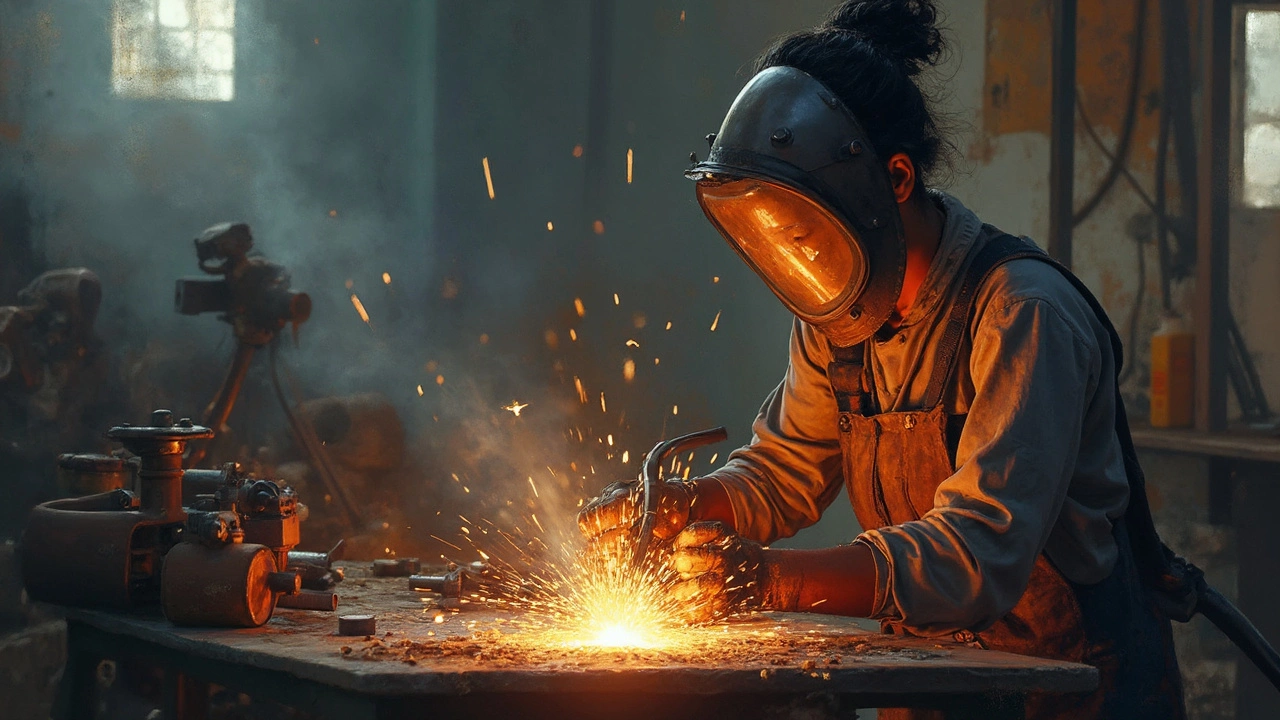
Ever thought about skipping the whole college thing and diving head-first into a trade career instead? It's a move that's catching on, especially among women looking for a solid path without the student loans that seem to go on forever. It’s not just about the money, though—demand for skilled workers is through the roof right now. From electricians to plumbers, there’s a need for hands-on expertise, and women are stepping up to the challenge.
Sure, college might sound like the go-to option. But let’s be real: it’s not for everyone. Vocational training is way quicker, a heck of a lot cheaper, and, don't forget, it leads directly to jobs that actually exist. So why is trade training gaining traction? Well, for starters, it’s practical. You’ll learn stuff you actually use from day one on the job. Plus, trades offer job security while the tech industry is always changing its mind about what skills matter most.
- The Cost of College vs. Trade Training
- Job Opportunities in Trades
- Breaking Gender Stereotypes
- Financial Benefits of Vocational Training
- Real-Life Success Stories
The Cost of College vs. Trade Training
When it comes to choosing between college and trade training, the cost difference is a massive factor. Think about it: the average university degree in the UK can leave you carrying around £50,000 in debt. Add to that the living expenses and you’ve got a pricey decision on your hands. On the other side, vocational training often costs a fraction of that. Most trade programs range from £2,000 to £8,000, and they're much quicker to complete too, typically taking one to two years.
But what about earning potential? Some folks assume trade careers don’t pay as much, but that's not quite on point. Skilled tradespeople can start making around £20,000 to £30,000 right off the bat, with potential to earn more as you gain experience. Electricians and plumbers, for instance, can pull in over £40,000 annually, sometimes even hitting the £50,000 mark depending on location and specialization.
Let’s bust a quick myth: you won’t be stuck flipping burgers while training either. Many vocational programs offer paid apprenticeships, so you’re earning and learning simultaneously. That’s something you rarely get in college. Plus, with companies in a never-ending struggle to find skilled trade workers, some even cover the cost of your training in exchange for a contract to work with them for a few years. It's a practical setup if you ask me.
To give you a clearer picture, here’s a simple breakdown of the average costs:
| Education Path | Average Cost | Duration | Average Starting Salary |
|---|---|---|---|
| University Degree | £50,000+ (Including living costs) | 3-4 years | £22,000 - £30,000 |
| Trade Training | £2,000 - £8,000 | 1-2 years | £20,000 - £30,000+ |
So, if you're all about dodging debt and getting into the workforce faster, vocational training might just be the way forward. It’s a direct route to landing a job without the financial hangover.
Job Opportunities in Trades
Alright, let’s talk about why trade careers rock when it comes to job opportunities. Unlike some fields where demand is sketchy, skilled trades are booming. Whether it’s plumbing, carpentry, or electrical work, these fields aren’t going anywhere—someone’s gotta fix the pipes, build stuff, and wire everything, right?
The best part? A lot of these trades are practically begging for workers. There's a real push to get more women into these roles because the industry benefits from a diverse workforce. And hey, more diversity means a wider range of ideas and problem-solving skills.
Sure, some folks still think of these jobs as a guy’s gig, but that's changing fast. Just look at businesses craving fresh talent in these areas. Job openings aren’t just a few here and there—we’re talking about a massive demand across the board. Plus, with the green energy boom, roles like solar panel technicians are popping up left and right, ready to be filled by eager new recruits.
- Electricians: Always in high demand, seeing as the whole world runs on electricity.
- Plumbers: Every building has plumbing, and there’s no robot that’s fixing a leaky toilet yet.
- Carpenters: If you like working with your hands, carpentry roles are out there aplenty. From construction sites to custom furniture, the sky's the limit.
- HVAC Technicians: Keeping places cool in summer and warm in winter is crucial, with job numbers climbing steadily.
And let's not forget the money angle. Many women in trades find starting salaries are surprisingly good and often better than typical entry-level office jobs that require a college degree. So, it's not just about getting a job—it's about getting a job that pays well and is always needed.

Breaking Gender Stereotypes
Let’s tackle the elephant in the room: trades have traditionally been seen as a guy's club, but that's changing. Women are making serious strides in fields like welding, carpentry, and electrical work. And why not? Skills have no gender, right? This shift is opening up a world of opportunities for women ready to grab the toolbox and show what they’re made of.
It’s not just hype—there are numbers to back it up. According to the National Association of Women in Construction, women now make up about 14% of the construction workforce, which doesn’t sound like a lot but it’s leaps and bounds from where it used to be. Women in trades aren’t just anomalies anymore; they’re role models, proving that they can do the job just as well, if not better.
"The future of the skilled trades is inclusive, and women play a pivotal role in paving the path forward," says Sarah Tracy, director of Women in HVACR.
These trailblazers aren’t just about blending into the field; they’re changing the landscape by excelling in the skills department. Trade careers are not only practical but empowering, offering women a break from traditional career paths and letting them shine in new arenas. It's not just about holding a wrench; it's about holding your own place in a dynamic, ever-growing industry.
More schools and vocational programs are supporting this trend by offering training that encourages female participation. This focus on vocational training specifically designed to support women is fostering an environment where anyone with the right skills and determination can thrive.
So, if you're a woman pondering a career in the trades, why not leap through that open door? The tools and support are there, just waiting to be picked up.
Financial Benefits of Vocational Training
Let's talk cash, shall we? One of the biggest perks of choosing a trade career over college is the sheer amount of money you'll save right off the bat. Tuition fees for vocational training programs are a fraction of what you'd pay for a four-year degree. We're talking potentially tens of thousands saved before you even start making a paycheck.
And speaking of paychecks, getting into the workforce faster means you start earning sooner. Imagine finishing high school, diving into a vocational training program, and landing a good-paying job within a couple of years while your college buddies are still hitting the books and racking up student loans. Feels like a head start, doesn’t it?
Now, let's crunch some numbers to give you a clearer picture. While the average student loan debt in the UK is a whopping £27,000, many trade programs cost under £10,000. That’s a huge weight off your shoulders. By dodging major debt, your earnings immediately count towards your financial stability rather than paying off loans for years.
The pay rates for many trades beat or match those of college-required jobs. Electricians, plumbers, and welders are making median salaries of around £30,000 to £40,000 annually. That’s not too shabby for positions you can secure without a traditional degree.
| Profession | Average Salary (£) | Education Required |
|---|---|---|
| Electrician | 35,000 | Vocational Training |
| Plumber | 33,000 | Vocational Training |
| Welder | 30,000 | Vocational Training |
Plus, skilled trades are in high demand, meaning job security is on your side. Doesn’t hurt that vocational training is usually more flexible too, paving the path for women to balance work, life, and any side hustles they’ve got going.
So, if financial freedom and job stability sound appealing, diving into a trade might just be the smartest move you'll make. Time to rethink what's possible when you trade in those long, costly years of college for practical skills and quicker paydays.

Real-Life Success Stories
Women are not just entering the realm of trade careers; they're thriving there. Let's talk about some real-life inspirations who’ve blazed trails in the vocational training world. These stories show how stepping out of the usual college path can lead to unexpected rewards.
Take Sarah Turner, a certified electrician from Manchester. After high school, Sarah figured out that a four-year degree with hefty student loans didn't fit into her plans. Instead, she enrolled in an apprenticeship program. Fast-forward five years, she’s running her own electrical business, earning a salary that beats the average college grad's pay. Not only is she enjoying financial freedom, but she's proud to be part of a sector that’s been traditionally seen as a male stronghold.
Then there’s Yasmin Khan, a keen advocate for women in trades. She became a licensed plumber, after initially pursuing a college degree that just wasn't her jam. Yasmin discovered that the plumbing world was more her style. Today, she’s not only a sought-after plumber in her hometown but also actively mentors young women considering trades. Yasmin believes that vocational skills are empowering and practical, allowing women to overcome gender norms while making a solid living.
And it's not all about personal success; the data backs it up. The Construction Industry Training Board in the UK reports an increase in women trainees in trades, with employment rates for such skilled roles consistently high. Companies are keenly seeking diverse talent, which means opportunities for women in this sector are continuously growing.
| Year | Women in Trade Apprenticeships |
|---|---|
| 2020 | 23% |
| 2025 | Current Trends Indicate 35% |
These success stories and trends show women can not only participate in but lead the field of trades. Vocational training opens doors, offering both financial security and personal fulfillment. So, if you’re considering your next move and college doesn’t fit your vibe, remember these stories—they prove the possibilities are plenty and incredibly rewarding for women in trades.
